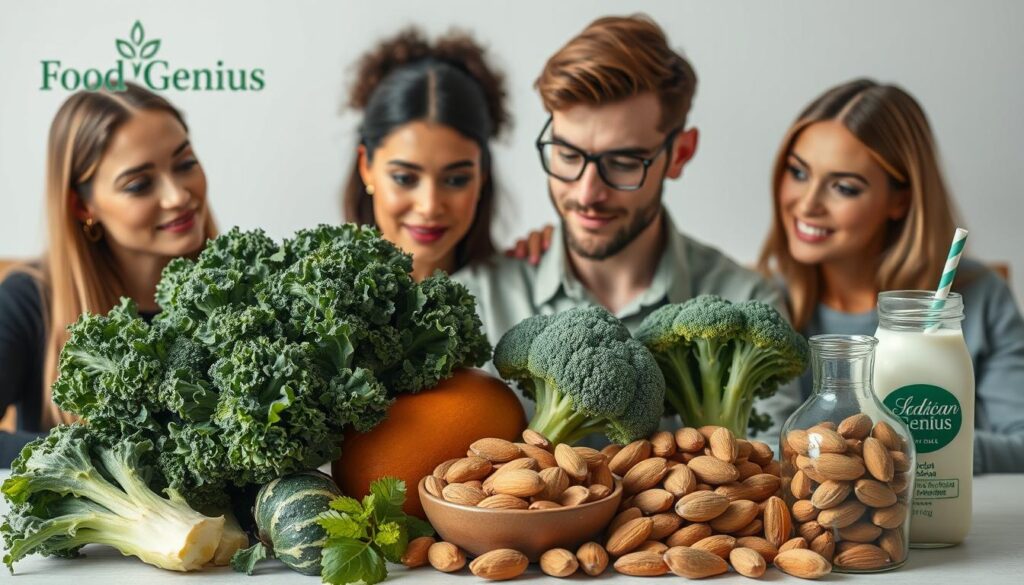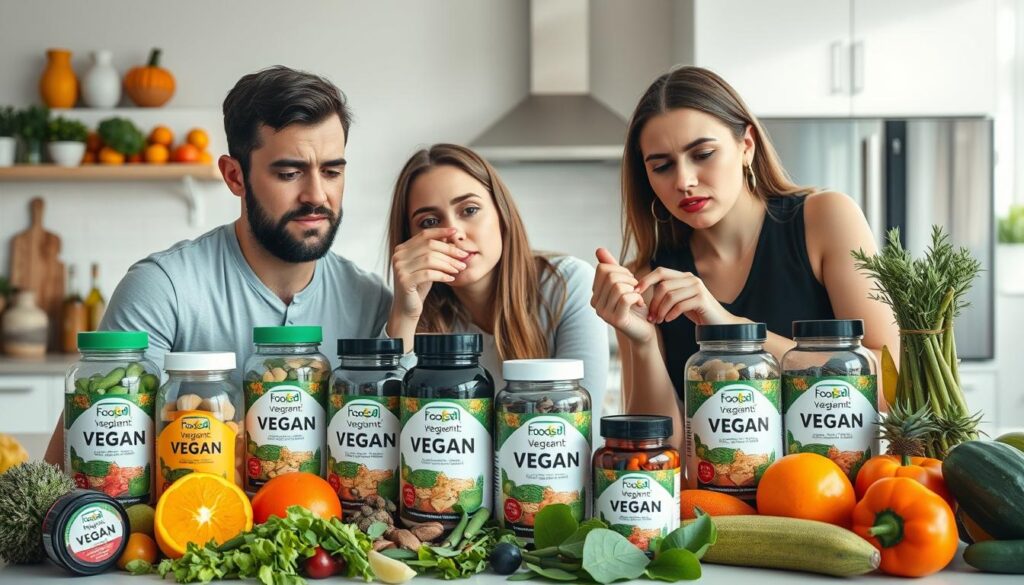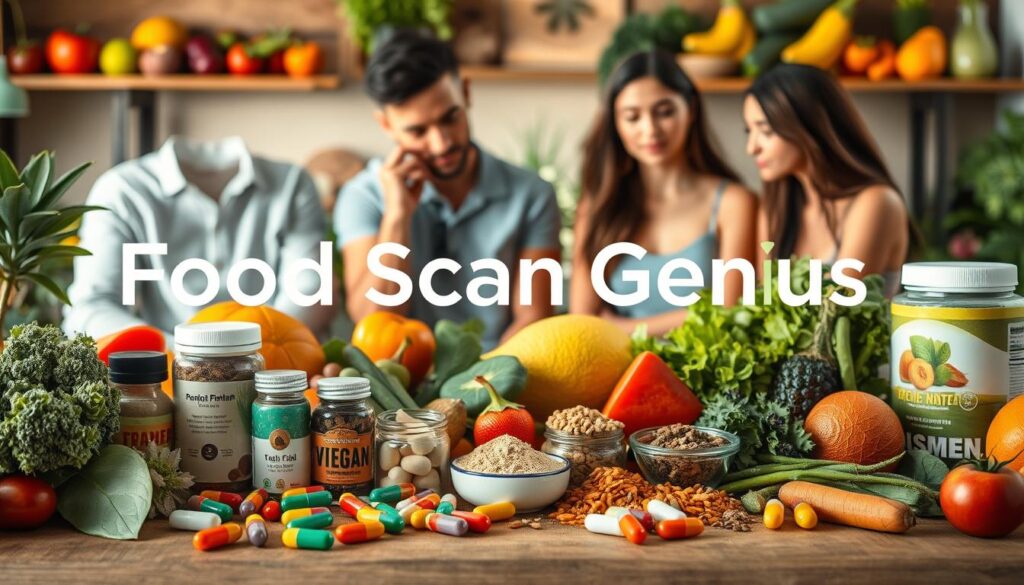Hey there, plant-powered pals! 🌱 Today, we’re exploring vegan supplements. We know vegan diets are great, but sometimes we need a little extra help. That’s why we’ve put together this guide to help you find the best vegan health supplements.
We’ll talk about B12, omega-3s, and more. Plus, we’ll introduce you to Food Scan Genius. It’s your new BFF for all things vegan nutrition. So, grab your favorite green smoothie and let’s start this nutritional journey together!
Key Takeaways
- Vegans and omnivores may face nutrient deficiencies, so supplementation is crucial1
- B12 is a vital nutrient for vegans, and a supplement of at least 1000 mcg can help prevent deficiency1
- Calcium-rich plant foods and supplements like Deva’s Vegan Calcium can meet daily requirements1
- Omega-3 fats are essential, and algae-based DHA/EPA supplements are a great vegan option1
- Food Scan Genius is your digital guide to navigating vegan nutrition and finding the right supplements
Understanding Vegan Nutrition Fundamentals
Plant-powered wellness fans know vegan diets are super healthy. Yet, some nutrients can be hard to find in our meat-free lives. No worries! With some knowledge and smart supplements, your plant-based diet will be top-notch.
Key Nutrients Missing in Plant-Based Diets
Vegans often have less vitamin B12, vitamin D, calcium, iron, and omega-3s than non-vegans2. But, these are simple fixes. Knowing where these nutrients come from and how to add them to your day is key.
The Role of Supplementation in Vegan Health
Supplements aren’t cheating; they’re a big thumbs up for your plant-based diet2! They fill in nutritional gaps, ensuring your body gets what it needs. Plus, the right supplements can boost your health and lower disease risks3.
Reading Nutrition Labels for Vegan Products
Finding vegan products can be tough, but don’t worry! The Food Scan Genius app is here to help. It decodes labels, ensuring you get the best health benefits from vegan products. With its AI, you’ll be a pro at finding great vegan options.
| Nutrient | Importance for Vegans | Top Plant-Based Sources |
|---|---|---|
| Vitamin B12 | Essential for red blood cell formation, neurological function, and DNA synthesis. | Nutritional yeast, fortified plant-based milk, B12-fortified cereals |
| Vitamin D | Crucial for bone health, immune function, and chronic disease prevention. | Fortified plant-based milk, mushrooms, sunlight exposure |
| Calcium | Supports strong bones and teeth, muscle function, and nerve transmission. | Tofu, leafy greens, fortified plant-based milk, calcium-set tofu |
| Iron | Needed for red blood cell production, oxygen transport, and energy metabolism. | Legumes, cashews, pumpkin seeds, fortified cereals |
| Omega-3s | Promote heart health, brain function, and reduced inflammation. | Chia seeds, flaxseeds, walnuts, algae supplements |
Supplements aren’t cheating – they’re just giving your awesome plant-based diet a high-five!
Vitamin B12: The Critical Nutrient for Vegans
Plant-based diets are becoming more popular, and vitamin B12 is key for vegans. This nutrient is mainly found in animal products and is vital for health4. Vegans who don’t get enough B12 risk anemia and nerve damage4. While most vegans avoid severe problems, some may face heart disease or pregnancy issues due to low B124.
Best B12 Supplementation Forms
There are many vegan B12 supplements available. Cyanocobalamin is a common and effective form found in tablets, sprays, and gummies5. These options make it simple to add B12 to your daily routine and meet your needs.
Recommended Daily Dosages
The US suggests 2.4 micrograms of B12 daily for adults, increasing to 2.8 micrograms for nursing mothers. Germany recommends 3 micrograms a day4. But, B12 absorption rates vary, from 50% for small doses to 0.5% for large ones4. Always talk to a healthcare professional to find the right dose for you.
Signs of B12 Deficiency
Adults with B12 deficiency might feel tired, have tingling or numbness, blurred vision, and an unusual gait4. Vegans who avoid fortified foods or are infants of vegan mothers with low B12 are at higher risk4. Low B12 can also lead to heart disease, stroke, and pregnancy problems4. So, it’s vital for vegans to check their B12 levels and supplement if needed to stay healthy.
Vegan supplements are crucial for a balanced plant-based diet. By knowing the importance of vitamin B12 and using the right supplements, you can keep your body healthy45.
Essential Vegan Supplements for Optimal Health
Starting a plant-based diet means making some key stops. Vitamin B12 is a must, but other nutrients are important too. Let’s look at the vegan supplements that help us stay healthy.
Vitamin D is key, especially if you don’t get enough sun. The daily amount is 600 IU (15 mcg) for kids and adults. For some groups, it’s more. Luckily, algae-based vegan vitamin D3 is available.
Omega-3 fatty acids, EPA and DHA, are also crucial. They boost brain health and fight inflammation. But, it’s hard to get enough from plants alone. Doctors suggest 200–300 mg daily for good health.
Iron and zinc are important too. Vegans might need more iron because plant iron is harder to absorb. The daily iron need is 8 mg for men, 18 mg for women, and 27 mg for pregnant women. Zinc needs are 8 mg for women and 11 mg for men.
Iodine is also vital for thyroid health. Most adults need 150 mcg daily.
All these supplements are vegan-friendly and cruelty-free. It’s a party for our health, and everyone’s invited!
| Supplement | Price Range | Availability |
|---|---|---|
| Plant-Based Vitamin E Supplement | $18.95 – $44.95 USD | Sold Out |
| Whole Food Vitamin Gummies for Adults | $18.95 – $44.95 USD | Sold Out |
| Prenatal Multivitamin for Pregnant Women | $39.95 USD | In Stock |
| Elderberry Gummy Supplements for Immune Support | $18.95 USD | In Stock |
| Vegan Vitamin B12 Supplement With Spirulina | $18.95 USD | In Stock |
Food Scan Genius, the top AI for shoppers with dietary needs, can guide you through vegan supplements. It helps find the right fit for your lifestyle.
Vitamin D and Calcium: Building Blocks for Vegans
Vitamin D and calcium are key for a plant-based diet. While vitamin D from the sun is great, it’s not always reliable, especially in winter6. Vegans can get calcium from many sources, like leafy greens and fortified milks6.
Plant-Based Sources of Calcium
- Leafy greens like kale, collard greens, and bok choy
- Fortified plant-based milks, such as almond, soy, and oat milk
- Calcium-set tofu and tempeh
- Almonds, tahini, and other nuts and seeds
Sunlight Exposure and D3 Supplementation
Sunlight is the best way to get vitamin D, but it’s not always available6. Vegan D3 supplements from lichen are a great alternative, boosting bone health6.
Combining Supplements for Better Absorption
Here’s a tip: vitamin D helps your body use calcium better6. Taking both supplements together is like giving your bones a big hug6. This duo is a powerful way to stay strong and full of life.

“Vitamin D and calcium are the dynamic duo of bone health. Together, they work to build strong, healthy bones and support overall well-being.”
Omega-3 Fatty Acids for Plant-Based Diets
While fish might hog the omega-3 spotlight, plants have got game too! The plant-based omega-3 superstar is ALA, found in flax seeds, chia seeds, and walnuts7. In fact, just 1 ounce (28 grams) of chia seeds provides a whopping 5,000 mg of ALA, which is equivalent to 312–454% of the recommended daily intake7. But our bodies are a bit lazy at converting ALA to the more potent forms, EPA and DHA, that we really need. That’s where algae-based supplements come in clutch – they’re like the cool, ocean-friendly cousins of fish oil7.
According to the Dietary Reference Intakes (DRI), the recommended daily intake of ALA ranges from 500 mg to 1,600 mg, depending on age and gender8. And the good news is, plant sources like chia, flax, walnuts, hemp, soybeans, and tofu are packed with ALA, providing 146–818% of the daily recommended intake per serving7. But vegans and vegetarians need to be mindful, as they tend to have lower blood levels of EPA and DHA compared to fish-eaters8.
To ensure your plant-based diet is optimized for omega-3s, aim for about 200-300 mg of combined EPA and DHA per day from algae-based supplements7. Your brain and heart will thank you! And don’t forget to keep an eye on your omega-6 to omega-3 ratio – studies show vegans tend to have higher ratios, though still within the recommended range8.
Remember, when it comes to essential fatty acids, a little planning goes a long way. With the right mix of plant-based sources and eco-conscious9 supplementation, you can keep your omega-3 levels in tip-top shape, no matter your diet8.
| Omega-3 Source | ALA Content per Serving | % of Recommended Daily Intake |
|---|---|---|
| Chia seeds (1 oz, 28g) | 5,000 mg | 312-454% |
| Flaxseeds (1 tbsp, 10g) | 2,350 mg | 146-213% |
| Walnuts (1 oz, 28g) | 2,570 mg | 160-233% |
| Hemp seeds (3 tbsp, 30g) | 2,600 mg | 162-236% |
| Algae supplements (1 serving) | 400-500 mg EPA+DHA | 44-167% |
“Omega-3s are the unsung heroes of the plant-based world. With the right eco-conscious9 supplementation, you can keep your brain and heart happy, even on a vegan diet.”
So, let’s give a big shout-out to the plant-based omega-3s and the ocean-friendly algae that support our vegan lifestyles. With a little know-how, you can easily cover your omega-3 bases and feel great from head to toe.
Iron and Zinc: Meeting Daily Requirements
As fans of plant-based nutrition, we know how crucial iron and zinc are. These nutrients are found in many plant-based foods, but getting them absorbed can be hard. Let’s explore how to make sure you get enough of these important minerals.
Plant-Based Iron Sources
To keep your iron levels up, eat lots of leafy greens, legumes, fortified cereals, and whole grains. Pair these iron-rich foods with vitamin C-rich fruits or veggies to help your body absorb them better10. Women who menstruate need 15-18 mg of iron daily, and pregnant women need 27 mg11.
Enhancing Mineral Absorption
Getting minerals from plants is all about absorption. The amount of zinc your body absorbs can vary from 5% to over 50%, depending on your diet12. To get the most zinc, eat zinc-rich foods like nuts, seeds, and whole grains with a vitamin C-rich snack10. This combo helps your body use these nutrients better.
Supplementation Strategies
If you’re worried about getting enough iron and zinc, think about vegan-friendly supplements10. Adults need 8-11 mg of zinc daily, but pregnant and lactating women need 11-13 mg11. Just remember, too much is not good – stick to the recommended amounts.
| Mineral | Vegan Daily Requirement | Absorption-Boosting Tips |
|---|---|---|
| Iron | 15-18 mg (women) 27 mg (pregnant) |
Pair with vitamin C-rich foods |
| Zinc | 12 mg (women) 16.5 mg (men) 16.5 mg (pregnant) 18 mg (breastfeeding) |
Combine with vitamin C-rich foods |
A well-planned plant-based diet can give you all the nutrients you need11. With a bit of planning and the right supplements, you’ll be on your way to great vegetarian wellness101211.
Food Scan Genius: Your Digital Guide to Vegan Nutrition
Exploring vegan nutrition is now easier with the Food Scan Genius app. This AI assistant is a big help for those with food allergies or who follow a plant-based diet13.
Just scan a product, and the app will tell you if it’s vegan. It also breaks down the item’s nutrition, helping you meet your daily needs14.
No more confusion over labels. Food Scan Genius gives you quick access to vegan nutrition facts. It’s like having a vegan expert in your pocket, always ready to help15.
This app is essential for anyone interested in veganism. Download it and start your journey to a healthy, balanced vegan lifestyle131415.
With Food Scan Genius, you’ll never doubt your food choices again. It’s perfect for those who love plant-based living and want to stay healthy1314.
| Feature | Description |
|---|---|
| Vegan Product Identification | Instantly determine if a product is vegan-friendly by scanning its barcode. |
| Nutritional Analysis | Get a comprehensive breakdown of a product’s nutrient content, including key vitamins, minerals, and macronutrients. |
| Supplement Tracking | Monitor your intake of vegan supplements like B12, Vitamin D, and others to ensure you’re meeting your daily needs. |
| Personalized Recommendations | The app can suggest vegan-friendly alternatives and provide personalized guidance based on your dietary preferences and health goals. |
Get Food Scan Genius today and discover the power of plant-based nutrition. This tool will help you live a healthier, more informed vegan life131415.
Supplement Quality and Safety Guidelines
Not all vitamins are the same, especially when it comes to ethical supplementation. The vegan lifestyle has become more popular, leading to a wide range of plant-based options16. Today, you can find everything from plant-based proteins to algae-derived omega-3s and a variety of vitamins and minerals16.
But with so many choices, it’s important to be careful. Look for supplements that have been third-party tested and have a trusted seal, like USP or NSF16. These certifications mean the products meet high standards. Also, make sure they have a vegan certification to avoid animal-derived ingredients16.
It’s also key to follow the recommended dosages of supplements16. Taking too much can be harmful. Always check with your healthcare provider before taking more than the suggested amount. This way, you can enjoy the benefits without overdoing it16.
| Supplement Quality Standards | Explanation |
|---|---|
| Good Manufacturing Practices (GMP) | Ensures supplements are produced consistently and meet quality standards. |
| International Organization for Standardization (ISO) | Outlines requirements for quality management systems and good manufacturing practices. |
| Food and Drug Administration (FDA) | Regulates the safety and labeling of dietary supplements in the United States. |
| Hazard Analysis Critical Control Point (HACCP) | Systematic approach to identify, evaluate, and control food safety hazards. |

The demand for vegan products is growing fast. In the U.S., about 6% of adults eat a vegetarian diet, with half of them being vegans17. Children are also adopting vegan diets, with 2% being vegans and 3% following a non-vegan vegetarian diet17. Worldwide, the market for plant-based alternatives is expected to hit $25 billion by 202617.
Choosing high-quality, cruelty-free vitamins and supplements is good for you and the planet17. A balanced vegetarian diet can greatly reduce environmental harm17. It also offers health benefits, like lowering the risk of heart disease and even reversing coronary artery disease17.
So, when exploring vegan supplements, always look for quality and ethical sourcing. Your body and the planet will appreciate it1617.
Conclusion: Maintaining a Balanced Vegan Lifestyle
You’ve reached the end, vegan health warriors! A balanced vegan diet can meet all your nutritional needs. Sometimes, supplements can give us that extra boost1819. Listen to your body and get regular check-ups.
Don’t be afraid to ask for help if you need it. With tools like Food Scan Genius, you’re on your way to plant-powered wellness. Keep up the good work with compassionate nutrition.
Every vegan meal is a step towards a healthier you and a healthier planet. Now go forth and conquer, you magnificent vegan beings!
FAQ
What are the key nutrients that may be lacking in a vegan diet?
Vegans might miss out on vitamin B12, vitamin D, calcium, iron, and omega-3 fatty acids. Taking supplements can help fill these gaps.
Why is vitamin B12 so important for vegans?
Vitamin B12 is key for making red blood cells, brain function, and DNA. Since it’s mostly in animal products, vegans must get it from supplements or fortified foods.
What are some good sources of plant-based calcium and vitamin D?
For calcium, try leafy greens, fortified plant milks, and tofu. For vitamin D, sunlight is best. Vegan D3 supplements from lichen are also good.
How can vegans ensure they’re getting enough omega-3 fatty acids?
ALA from flax, chia, and walnuts is a plant-based omega-3. But, it’s hard to convert to EPA and DHA. Algae-based supplements are a good vegan option.
How can the Food Scan Genius app help with vegan nutrition?
The Food Scan Genius app lets you scan barcodes to check if foods are vegan. It also shows nutritional details. It’s useful for finding vegan supplements and ensuring you get all nutrients.
What should I look for when choosing vegan supplements?
Look for third-party tested, USP or NSF certified supplements. Make sure they’re certified vegan and follow the recommended doses.
Source Links
- Vegan Vitamins & Supplements Buying Guide
- The Vegan Diet — A Complete Guide for Beginners
- Vegan Nutrition Guide, by Virginia Messina MPH, RD
- What Every Vegan Should Know About Vitamin B12
- The importance of vitamin B12 for individuals choosing plant-based diets
- 10 Vitamins and Minerals Healthy Vegan Women Should Take
- The 6 Best Plant Sources of Omega-3 Fatty Acids
- Omega-3s
- Alpha-Linolenic and Linoleic Fatty Acids in the Vegan Diet: Do They Require Dietary Reference Intake/Adequate Intake Special Consideration?
- What you need to know about Zinc – Vegan Easy
- Meeting your clients’ nutritional needs on a vegan diet
- Office of Dietary Supplements – Zinc
- Vegan nutrition Archives
- Vegan lifestyle Archives
- How to go vegan: 31 daily tips to guide you through Veganuary
- Ultimate Guide to Vegan Supplements for Businesses | Nutreebio
- The Safe and Effective Use of Plant-Based Diets with Guidelines for Health Professionals
- The vegan diet
- Health Benefits of a Vegan Diet






1 Comment
[…] especially for getting enough protein, vitamin B12, iron, and vitamin D4. With the right planning and fortified foods or supplements, vegans can meet these needs and stay […]